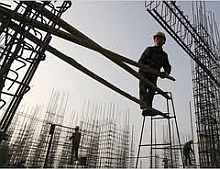Rating agency Fitch Ratings said there is more pain in store for India's infrastructure projects, which are already reeling under delays and regulatory hurdles, due to sector specific stresses and macroeconomic challenges.
 It maintained negative outlook for Indian infrastructure projects.
It maintained negative outlook for Indian infrastructure projects.The ratings of project companies will remain under pressure from aspects like equity capital constraints, high interest rates, currency depreciation and fuel shortages, Fitch said in a statement.
The slowing of economic growth and execution delays for power and prospects of slowing traffic growth for transportation would also put pressure.
��
The proportion of Negative rating Outlooks in Fitch's portfolio (excluding newly rated projects since December 2011) is 24 per cent as against only 19 per cent seven months ago. It would have been higher if not for non-contractual sponsor support and the expectation of continued support in many cases.
The generally low rating levels have already factored in some of the risks. This cushion contributes to the high level of Stable Outlooks. Outlooks for some old projects hit by the above factors may still be Stable where Fitch has already taken sufficient negative rating action to accommodate foreseeable stress.
Sponsors with stretched balance sheets will struggle to raise funds for a growing number of construction projects and to support underperforming assets, largely because of the weak and volatile stock market, Fitch said.
Developers may be forced to selectively support projects with a long-term economic value as against earlier strategy of preserving bank relationships by propping up projects. Such a strategy could trigger some project loan defaults or necessitate debt restructuring programmes.
Power projects will continue to grapple with fuel shortages and weak off-taker utilities. The state-owned Coal India Limited's mandate to sign fuel supply agreements is unlikely to overcome the systemic shortage of domestic coal.
Despite the recent fall in global coal prices, power generated from imported coal will still be expensive given financial distress for several off-taker utilities. Also, a weak rupee negates the benefit of falling coal prices.
The economic slowdown could moderate traffic growth expectation for the transportation sector - both toll roads and airports.
The lower interest rates, a rebound in economic growth, renewed investor appetite facilitating equity flows into infrastructure and a strengthening rupee could help stabilise the credit quality of infrastructure projects.
Government action to removing hurdles for timely project execution, addressing fuel scarcity and initiating sector reforms (such as strengthening utilities) could also help preserve the credit quality.

No comments:
Post a Comment